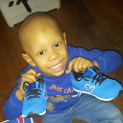Immuno-therapeutic Targeting of CD56 in CBA2T3/GLIS2-AML in Children

Co-investigator: Dr. Colin Correnti
Background
Acute myeloid leukemia (AML) is a particularly devastating disease in infants, where therapies that are intended to cure leukemia frequently fail to cure the disease and lead to significant life-limiting or life-ending complications. Leukemia-specific targeted therapies are critical especially in these most vulnerable patients in order to cure the disease without causing irreversible damage to their growing body. Through the largest and most detailed sequencing studies, we have identified a genetic abnormality that is only seen in children younger than 3 years of age. This genetic alteration called CBF/GLIS causes a lack of response to all available therapies, and more than 80% of babies with this mutation die of leukemia despite receiving intensive chemotherapy. We have discovered that leukemic cells in babies with CBF/GLIS express a protein called CD56 at high levels. Expression of this protein on the leukemia cells provides an opportunity for targeting the leukemic cells with immunotherapy. Fortunately, one such immunotherapy (called antibody-drug conjugates; CD56-ADCs) has been developed for other diseases that can be repurposed for use in AML. We can also create new immunotherapies against CD56.
Project Goal
In this project, we will test the ability of available CD56-ADCs to kill CBF/GLIS-positive AML cells as well as create a novel immunotherapy, called bi-specific (BITE) or multi-specific immunotherapies, against CD56. We are highly optimistic that given the high CD56 expression on leukemic cells, we can rapidly identify or create new immunotherapies for infants with high-risk AML.
Project Update 2020
We discovered that a protein called CD56 is expressed in leukemic cells of a resistant type of leukemia that is seen only in babies. As part of this grant, we proposed to test available CD56-targeted drugs and develop new drugs for the most effective treatment of this type of highly refractory infant leukemia. In the last year of this grant period, we have not only tested and shown the effectiveness of the available CD56 antibody-drug conjugates (CD56-ADC), but we have developed two different CD56-ADCs with different drugs. In addition, we have generated a new class of immunotherapy called bi-specific (BITE) or multi-specific antibodies against CD56 and T-immune cells, to force leukemic and T-immune cells together to stimulate immune-mediated cell kill. To date, our studies have shown efficacy in cell lines, and we are in the process of starting to test these new drugs in animal models. We anticipate that given positive early results we will start a clinical trial within two years.

